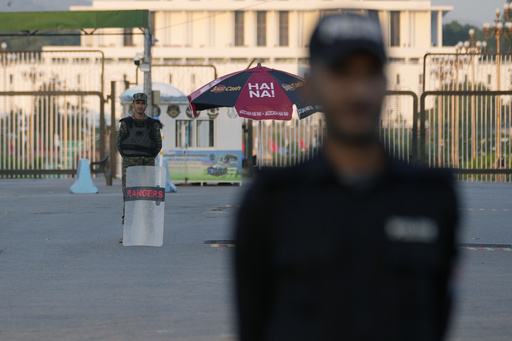
ISLAMABAD — This week, Pakistan is hosting a significant security summit in Islamabad, featuring high-ranking officials from both its long-time ally China and its rival India.
The Shanghai Cooperation Organization (SCO), created in 2001 by China and Russia, serves as a platform for discussing security issues in Central Asia and the broader region. However, the focus of this event is primarily on Pakistan’s internal security challenges.
The nation is facing mounting threats, highlighted by a recent attack on a convoy carrying foreign diplomats, violent demonstrations by supporters of an imprisoned former prime minister, and a bombing near the largest airport in the country. These incidents underscore the difficulties Pakistan faces in managing escalating violence from insurgent groups.
The summit commences on Tuesday and comes at a critical juncture for Pakistan’s government. Despite its claims of thwarting attacks through intelligence operations and preventive measures, the reality on the ground suggests increasing challenges in maintaining control and ensuring the safety of both visitors and residents.
In recent weeks, separatists in Balochistan, a province in southwest Pakistan, have killed Chinese nationals in Karachi and have launched deadly attacks on miners and workers. The Baloch Liberation Army (BLA) has demonstrated a growing ability to coordinate attacks across different regions, evolving its tactics and presenting a more significant threat to the security apparatus in place.
The BLA seeks independence for Balochistan and shares a common adversary—the government—with the Pakistani Taliban, who continue their violent campaigns in the Khyber Pakhtunkhwa province bordering Afghanistan. The heightened boldness of attacks raises concerns about the government’s ability to secure the summit despite apparent heightened security measures.
While militants may find the summit well-guarded, previous experience shows that Islamabad’s street checkpoints often allow vehicles to pass with minimal scrutiny. The lack of consistent body searches, except near government buildings and high-end hotels, complicates security measures.
“There’s a lot at stake for the state, and the primary mission is to conduct the summit peacefully,” noted Imtiaz Gul, executive director of the Center for Research and Security Studies. He stressed the formidable task the government faces in dispelling the notion of a failing security apparatus.
From an economic perspective, Pakistan is already feeling the strain of previous unrest. Finance Minister Muhammad Aurangzeb reported that recent civil disturbances have cost the economy cumulative daily losses exceeding $684 million. This loss encompasses a wide range of sectors, adversely affecting business operations, local commerce, and essential services.
With its reliance on International Monetary Fund assistance and loans from allied nations, Pakistan cannot afford such economic setbacks or increased public outrage. Ongoing protests over surging energy costs and living expenses further complicate the situation.
In light of the summit, the government has declared a three-day holiday and has reportedly ordered the closure of numerous establishments in Islamabad and the nearby garrison city of Rawalpindi. While officials have denied these reports, the response has not been forceful.
“Major conferences are typically intended to foster trade and enhance a nation’s reputation,” Gul remarked. However, in this case, Islamabad’s unusual atmosphere amid the high-profile event departs from normalcy, indicating a lack of creative problem-solving by the authorities.
This summit represents Pakistan’s opportunity to project a positive image, especially in the presence of China—an important partner facing its own security threats—and India, which will have its foreign minister attending for the first time since 2015. The historical context of conflicts between India and Pakistan, along with territorial tensions between India and China, underscores the importance of this gathering.
Pakistan, unfamiliar with hosting such a prominent international meeting, is making efforts to present its best self amidst ongoing domestic turmoil. Senior defense analyst Abdullah Khan suggests that demonstrating international legitimacy is crucial for the government, particularly to counter the narrative of isolation stemming from its internal challenges.
“The attendance of heads of state and senior officials would itself mark a milestone, signaling an end to Pakistan’s perceived isolation,” Khan articulated. A smoothly executed SCO summit could bolster the country’s standing on the global stage.
